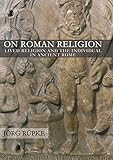On Roman Religion : Lived Religion and the Individual in Ancient Rome / Jörg Rüpke.
Material type: TextSeries: Cornell Studies in Classical Philology ; 67Publisher: Ithaca, NY : Cornell University Press, [2016]Copyright date: ©2016Description: 1 online resource (210 p.) : 10 b&w halftonesContent type:
TextSeries: Cornell Studies in Classical Philology ; 67Publisher: Ithaca, NY : Cornell University Press, [2016]Copyright date: ©2016Description: 1 online resource (210 p.) : 10 b&w halftonesContent type: - 9781501706264
- 292.07 23
- BL803 .R84 2017
- online - DeGruyter
| Item type | Current library | Call number | URL | Status | Notes | Barcode | |
|---|---|---|---|---|---|---|---|
 eBook
eBook
|
Biblioteca "Angelicum" Pont. Univ. S.Tommaso d'Aquino Nuvola online | online - DeGruyter (Browse shelf(Opens below)) | Online access | Not for loan (Accesso limitato) | Accesso per gli utenti autorizzati / Access for authorized users | (dgr)9781501706264 |
Browsing Biblioteca "Angelicum" Pont. Univ. S.Tommaso d'Aquino shelves, Shelving location: Nuvola online Close shelf browser (Hides shelf browser)
Frontmatter -- Contents -- Acknowledgments -- Introduction -- 1. Individual Appropriation of Religion -- 2. Individual Decision and Social Order -- 3. Appropriating Images—Embodying Gods -- 4. Testing the Limits of Ritual Choices -- 5. Reconstructing Religious Experience -- 6. Dynamics of Individual Appropriation -- 7. Religious Communication -- 8. Instructing Literary Practice in The Shepherd of Hermas -- Conclusion -- Bibliography -- General Index -- Index of Passages
restricted access online access with authorization star
http://purl.org/coar/access_right/c_16ec
Provocative reading for anyone interested in Roman culture in the late Republic and early Empire.― Religious Studies ReviewWas religious practice in ancient Rome cultic and hostile to individual expression? Or was there, rather, considerable latitude for individual initiative and creativity? Jörg Rüpke, one of the world’s leading authorities on Roman religion, demonstrates in his new book that it was a lived religion with individual appropriations evident at the heart of such rituals as praying, dedicating, making vows, and reading. On Roman Religion definitively dismantles previous approaches that depicted religious practice as uniform and static. Juxtaposing very different, strategic, and even subversive forms of individuality with traditions, their normative claims, and their institutional protections, Rüpke highlights the dynamic character of Rome’s religious institutions and traditions.In Rüpke’s view, lived ancient religion is as much about variations or even outright deviance as it is about attempts and failures to establish or change rules and roles and to communicate them via priesthoods, practices related to images or classified as magic, and literary practices. Rüpke analyzes observations of religious experience by contemporary authors including Propertius, Ovid, and the author of the "Shepherd of Hermas." These authors, in very different ways, reflect on individual appropriation of religion among their contemporaries, and they offer these reflections to their readership or audiences. Rüpke also concentrates on the ways in which literary texts and inscriptions informed the practice of rituals.
Mode of access: Internet via World Wide Web.
In English.
Description based on online resource; title from PDF title page (publisher's Web site, viewed 26. Apr 2024)









